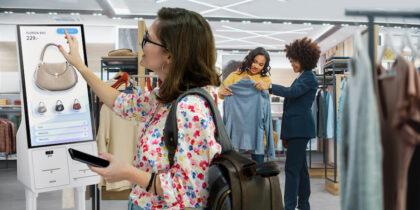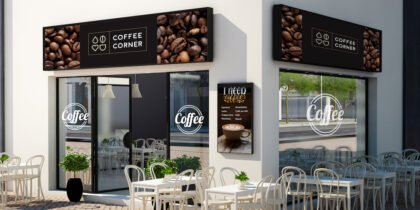Digital stores have expansive information. Physical stores have product intimacy, ready inventory and skilled salespeople. Fusing those together to create elevated, personalized shopping experiences is the key to helping stores compete in today’s hyper-competitive, multichannel retail marketplace. Retailers succeeding in transforming the store experience are leveraging powerful new selling tools including assistive tablets, kiosks, mirror displays and the power of analytics to bring the best of digital into the store environment, attracting customers and driving revenue.
Despite the hoopla over digital channels, an average of 85 percent of sales still come through physical store locations, according to Goldman Sachs.
Leveraging Assistive Selling Technology
Digital tools help convert that traffic into revenue, by adding the information consumers have learned to expect from their online experiences to the in-store experience.
Assistive Selling Tools: Salespeople are a powerful differentiator for brick and mortar stores — provided associates can offer the same or better information than customers can obtain on their own. The TimeTrade survey found that 49 percent of shoppers are “extremely likely” to make a purchase when helped by a knowledgeable associate, and another 39 percent are “somewhat likely.”
Mobile devices such as Samsung Galaxy tablets empower store associates to bring service to the customer. By sharing a tablet with stylus like the Samsung Galaxy Tab A or Galaxy Tab S4, the associate and customer can explore options and accessories, scroll through a look book and even reference the customer’s purchase history. They can see how a new scarf or tie would coordinate with a shirt they purchased previously, or how new end tables would look with the couch they acquired two years ago. Then they can complete the transaction on the spot, including signing documents such as an extended warranty on the new furniture with the Tab S4’s S Pen stylus.
Assistive selling tablets have proven extremely successful for women’s apparel retailer Avenue, which empowers associates with Samsung Galaxy tablets to search its central inventory, showcase additional styles and colors, and complete sales. The tablets are helping to close almost four sales per week at each store — twice as many as expected — with an average transaction size of 20 percent higher, because customers are ordering multiple items and colors. Avenue saw a return on investment in less than three months.
Transform Retail Associate Performance
Get your free guide to empowering retail associates with mobile devices and data. Download Now
Kiosks: Consumers are increasingly drawn to self-service options as their comfort with technology rises. Kiosks and other display technologies bring the online shopping experience into the store, enabling a wide variety of applications including endless aisle, rewards lookup, price lookup and assistive selling tools such as ratings and customer reviews. Kiosks can also take a wide range of form factors, from classic podiums to sleek, arm-mounted tablets to larger digital displays. According to RIS News, 49 percent of retailers have started or will start a major upgrade to kiosk or digital display technology in the next two years.
Mirror Displays: One of the newest innovations in retail technology solutions for stores is Samsung interactive mirror displays, which enable the customer to see a reflection of themselves along with content. For example, on the edges of a mirror display in a fitting room, the retailer can list the other colors and sizes available for the item the customer has tried on, as well as ratings from other customers and sell copy on the features that make the product a great value. On the store floor, mirror displays create fun, interactive and informative experiences that drive conversions and reinforce brand messaging. Apps enable mirrors to interact with mobile devices, opening up even more possibilities.
Fashion brand FTL Moda, for example, infused a high-tech feel into a recent New York Fashion Week event by positioning mirror displays throughout its show space, creating a differentiating experience for every guest while allowing FTL Moda to offer a richer exploration of its new line.
Analytics Enrich Retail Selling Tools
What really sets digital in-store selling tools apart is their ability to leverage customer data to personalize the store experience. By accessing observable data, such as age, size and gender, retailers can refine the shopping experience by tailoring content such as recommendation engines to those parameters. Layering on specific information about an individual shopper, obtained from loyalty programs, online activity or third-party data, makes the visit hyper-personalized, creating the elevated, relevant experience many consumers crave. According to PwC Research, 59 percent of consumers call “real-time, personalized offers especially for me” an important part of shopping. As technologies such as IOT and AI mature, they will increase retailers’ ability to gather data and customize store experiences via assistive selling devices in real time.
Retailers are transforming the store experience to better match the high expectations set by digital leaders. Smart application of retail technology solutions enable retailers to bring the best of digital into the store, fueling the store visit with the information, personalization and exceptional experiences that excite customers and drive conversions and revenue.
Looking for more cutting-edge retail solutions? Explore our full line of innovative retail technology.







